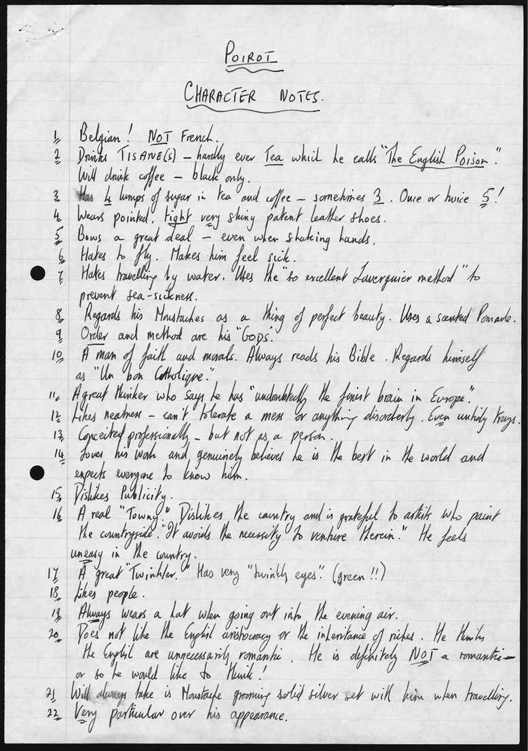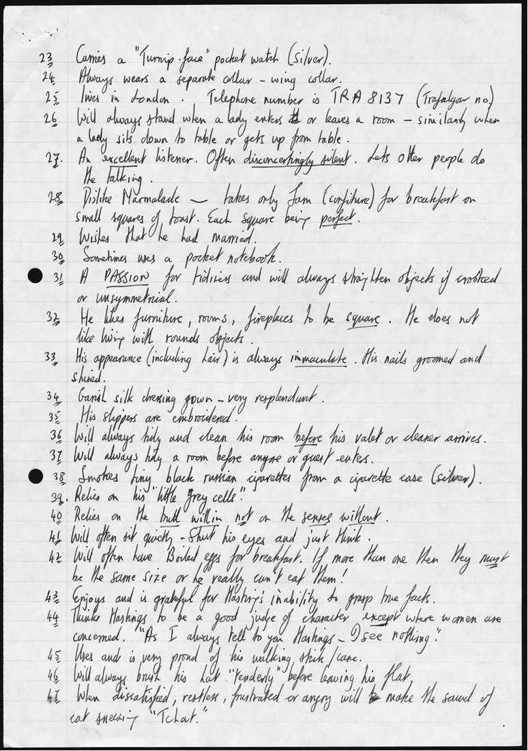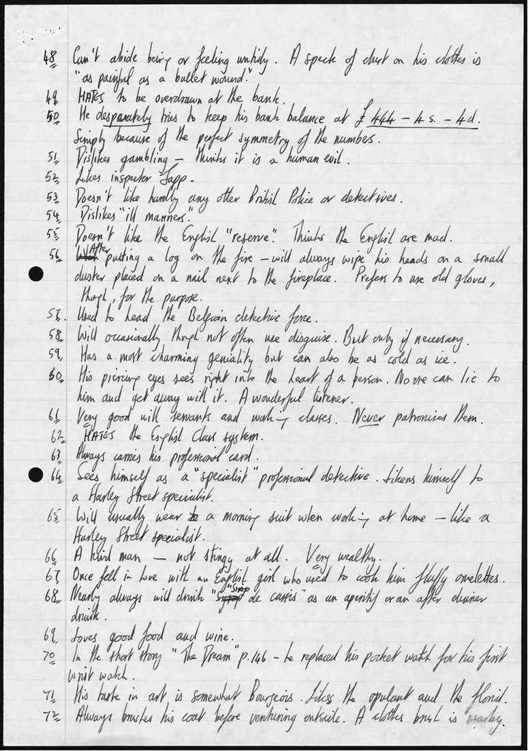Poirot and Me (45 page)
Authors: David Suchet,Geoffrey Wansell
Tags: #Biography & Autobiography, #Entertainment & Performing Arts

have received from our team of writers over
the years. Each and every one has helped
me to give Poirot depth and complexity for
the television audience, which has made a
difference to the way in which the world
views the little Belgian.
I think we have expanded on Poirot’s
moral faith, which takes him beyond a
secular society; explored his particular sense
of isolation, which sets him apart from others
around him; allowed him to look wistfully at
lovers, aware that they have something
which has been missing from his life; brought
his passion to control the world as a way of
controlling his own life to the fore; and –
perhaps most of important of all – allowed
his intuition to reveal itself. His ‘little grey
cells’ are important to him, of course, but his
ability
to
intuit
exceeds
even
their
importance, for, as Poirot puts it himself, ‘I
listen to what you say, but I hear what you
mean.’
What no one can ignore in this most
beautiful part of the Devon countryside is
that this is the end of an era. That feeling
grows stronger and stronger among the crew
on these last days of shooting. There is
wistfulness in the air, even though no one
else here at Greenway this week has been
there since the beginning in 1988 – except
for my driver Sean and me. But there is also
happiness, and a sense of achievement in
helping Poirot through some of his most
difficult moments.
Now, finishing the final film, I know I was
right to film Dead Man’s Folly last. It is
infinitely better that he should remain alive
in my memory as we shoot the final scenes
in the summer sunshine outside Dame
Agatha’s house. Filming with Poirot alive as
we finish brings a feeling of exultation at his
memory. That is what Poirot would have
wanted, what Dame Agatha would have
wanted, and that is what we have managed
to do. He is alive in all our minds at the end:
a man that can never truly die.
There are so many moments that stick in
my mind. On the Wednesday after we arrive,
for example, I speak my very last words as
Poirot on film: and they are incredibly
mundane.
Poirot asks Ariadne Oliver whose idea it
was to hold a ‘murder hunt’ at the fete that
is the centre of the story.
‘The Warburtons’, I think,’ she replies.
There is no great, dramatic monologue to
mark my end as Poirot. He simply says, ‘The
owners of this property?’
Those are my very last lines to camera.
Early that evening, I celebrate that
moment privately with every member of the
crew of seventy or so, from the assistant
directors to the designers, from the costume
and make-up ladies to the camera
department, from the props boys to the
sound team. I buy some bottles of
Champagne and we sit in the dining tent
that we have erected in the garden of Dame
Agatha’s house, toasting her memory and
the final series.
There are strong emotions among each
and every one of us as I stand beside Sean
and look across at the many friends I have
made over the years, not least my stand-in,
Peter Hale, who has been there with me for
the past fourteen years. Any series of films
makes a family of the crew who help to
make them, but this series has been
particularly special because it marks the end
for an exceptional character.
After the small party for the crew, I go
inside Greenway itself for dinner in Dame
Agatha’s own dining room, with her
grandson, Mathew Prichard, and he is kind
and generous. It brings back memories for
me of the lunch I had all those years ago –
before I had even made my first film as
Poirot – with his mother Rosalind and her
husband Anthony Hicks, where they warned
me that the audience must never laugh at
Poirot, only with him. I think I have managed
to do that. I truly hope so.
Later that night, Sheila arrives from
London to spend the final day’s filming with
me, and we say to each other what an
extraordinary journey it has been for us
both. It was one which we never knew, from
year to year, whether it would ever continue.
We were always on tenterhooks. But when
this episode finishes, it will be the first time
in my life when I won’t have to wait to be
told whether or not we are going to be
filming Poirot again. We will have finished,
and I am sixty-seven. We started when I was
forty-two. It is half my adult lifetime.
To say that this is going to be a relief is an
understatement, because Sheila knows only
too well just how much the uncertainty
about whether or not there would ever be a
new series cost me year after year. This final
film means that the stress has slipped
quietly away. There never will be another
series with me playing Poirot, not after
tomorrow.
Sitting quietly alone together, Sheila and I
also ask each other what exactly it is that
makes Poirot so special to so many millions
of people around the world. After a little
thought, we agree that our son-in-law,
Elliott, Katherine’s husband, summed it up
beautifully when he explained to us not long
ago that what makes Poirot so appealing,
enduring and timeless as a man is that he
possesses one of the finest and clearest
moral compasses of any fictional character.
Somehow, Elliott explains, we would all like
to be him, to have his clarity and moral
strength. Sheila and I agree: that lies at the
very heart of his appeal.
The final day dawns bright and sunny, but
with barely a breath of wind, and the still air
brings a kind of languor to Greenway and its
gardens. The crew have no need of me in
the morning, because they are filming on the
river, and so I am free to do some press
interviews to support the final series. That
means that Sean does not collect Sheila and
me from our hotel until after eleven, and we
do not get to my trailer at Greenway until
just before noon. I don’t have to change into
my costume yet – that can wait until lunch.
We just have to film two scenes of my
walking down to the boathouse and then up
to the house again.
In the middle of the afternoon, the camera
crew come back up from the river, while I
am in make-up, and begin to set up outside
Greenway. They know, and so does
everyone there, that this really is the end,
and everyone seems intent to shake my
hand and hug me to mark the occasion.
By the time I am getting into my costume
late that afternoon, however, the weather
has changed. There are now rain clouds in
the air as I watch Sian Turner Miller, my
make-up lady, stick on my moustache in the
trailer, hidden away behind the walls of
Greenway’s
great
vegetable
garden,
complete with its own greenhouse, one that
Poirot would have been proud to use for his
marrows.
Then, as I walk out in front of Greenway
for the final scenes, a large crowd has
gathered, mostly made up of the crew, but
there are also visitors and tourists who have
come to admire Dame Agatha’s house. Most
of them had no idea that filming was going
on, nor that this was Poirot’s final day. They
just happened upon the unit, and me.
Once again, I find myself wondering – just
before the director shouts, ‘Action’ – whether
I am Poirot or David Suchet in this most
unreal of moments. But there are no tears in
my eyes as I walk down towards the
boathouse, nor are there any when I walk
back up, open the front door of Greenway
and go inside.
It is just before five o’clock on Thursday 28
June 2013 when Tom Vaughan, the director,
shouts, ‘Cut.’
Then, when I step outside Greenway
again, there is a huge round of applause as
Marcus Catlin, the first assistant director on
the
shoot,
announces,
‘Ladies
and
Gentlemen, that is a wrap for Poirot.’ He
pauses: ‘After twenty-five years.’
People are clapping and crying as I walk
across the front porch of the house and raise
my arms aloft to thank them. Then my tears
come. I cannot stop them. This is the end of
something that I have lived with for half my
life, the culmination of a dream that has
lasted years, the pinnacle of what I had
worked towards for so long.
The rain drizzles down on us, but no one
minds or moves. Mathew Prichard, in a brief
speech, calls it ‘an historic moment’ and then
generously explains how sure he is that his
grandmother would have approved of my
Poirot. Then Michelle Buck, one of the
executive producers who helped to transform
the films, makes a brief speech of her own,
in which she admits, ‘We’ve pulled off
something that we did not think was
possible.’
Now it is my turn. But I do not speak as
me. I speak in Poirot’s own unmistakeable
Belgian accent and thank everyone for their
support, even ‘David Suchet, who zinks he
knows me.’
I tell the crew that Poirot is always there
to help if they need him. ‘You know ze
telephone number. It is Trafalgar 8137.’
Then I pause: ‘But most of all, to you all,
au revoir and merci beaucoup!’
My mind went back to Poirot’s last
moments of life in Curtain, which we filmed
all those months ago, because here I am
again saying farewell to a cher ami for the
last time.


